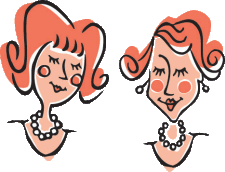Forming Plurals
 Plurals signify that there is more than one of something. Most words in the English language are made plural by simply adding -es to the end of the word. For example, boy becomes boys, kitten becomes kittens, and so on.
Plurals signify that there is more than one of something. Most words in the English language are made plural by simply adding -es to the end of the word. For example, boy becomes boys, kitten becomes kittens, and so on.
So far, so good. The problem comes for words that do not form their plurals in this simple manner. Here are some rules that can help you correctly form plurals for some of these words.
- To form the plural of a word that ends with a consonant followed by -y, change the -y to i, and add -es.city – cities lady – ladies candy – candiesHowever, to form the plural of a word that ends with a vowel followed by -y, simply add -s.turkey – turkeys donkey – donkeys valley – valleys
- To form the plural of most words that end with -f or -fe, simply add -s.chief – chiefs safe – safes gulf – gulfsHowever, in some cases, the plural is formed by changing the -f to v, and adding -es.wife – wives leaf – leaves knife – knives
- For most words that end with -o preceded by a consonant, the plural is formed by adding -es.potato – potatoes hero – heroes echo – echoesWhen -o is preceded by a vowel, the plural is formed by simply adding -s.video – videos patio – patios studio – studios
 For compound words that are not hyphenated or separated by spaces, the plural is formed by adding -s or -es.checkbook – checkbooks sandbox – sandboxes windmill – windmillsHowever, when a compound word is hyphenated or separated by spaces, -s or -es is added to the word that is to be pluralized. The word to be pluralized is the main word in the compound word.mother-in-law – mothers-in-law poet laureate – poets laureate
For compound words that are not hyphenated or separated by spaces, the plural is formed by adding -s or -es.checkbook – checkbooks sandbox – sandboxes windmill – windmillsHowever, when a compound word is hyphenated or separated by spaces, -s or -es is added to the word that is to be pluralized. The word to be pluralized is the main word in the compound word.mother-in-law – mothers-in-law poet laureate – poets laureate
If you can’t identify a main word to be made plural, simply add -s or -es.
grown-up – grown-ups lieutenant-colonel – lieutenant-colonels
These rules will not help you with words that have irregular plural forms such as mice and stimuli. But they will help you correctly form the plural for many of the words you encounter.
